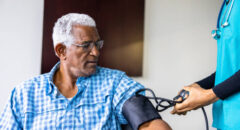
Travel is obviously an amazing way to learn about new cultures, create memories with your friends and family, and build up your social media following with scenic pics. However, there are a few risks to think of if you’re taking frequent lengthy flights across the globe.
What Counts As A “Long-Distance” Trip?
A trip is considered a long-distance trip, according to the Centers for Disease Control (CDC) when it goes past the four-hour mark. So if you’re leaving the East Coast and heading to California, or anywhere out of a four-hour range by car, plane or train, you could be at risk for developing blood clots, or Deep Vein Thrombosis.
Lengthy periods of sitting on a plane or anywhere in a confined space for hours can put you at risk of blood clots because of limited circulation through your legs.
Typically, if you develop a blood clot, it will dissolve on its own without causing you any issues. But if a blood clot doesn’t dissolve, it can break apart and travel to your lungs, causing a pulmonary embolism, which could be fatal.
Know Your Risks
All of this may sound scary, but you should know that generally, your risk of death from a blood clot is pretty small. However, if you have one or more of the conditions listed below, your risk is a bit higher:
-Older age (risk increases after age 40)
-Obesity (body mass index [BMI] greater than 30kg/m2)
-Recent surgery or injury (within 3 months)
-Use of estrogen-containing contraceptives (for example, birth control pills, rings, patches)
-Hormone replacement therapy (medical treatment in which hormones are given to reduce the effects of menopause)
-Pregnancy and the postpartum period (up to 3 months after childbirth)
-Previous blood clot or a family history of blood clots
-Active cancer or recent cancer treatment
-Limited mobility (for example, a leg cast)
-A catheter placed in a large vein
-Varicose veins
Even if you don’t have one of these conditions, it won’t hurt to ask your doctor about your likelihood of developing a blood clot on the next big trip. Just to be safe!
RELATED: Metabolic Syndrome Could Raise Your Odds of Recurrent Blood Clots
Are There Any Warning Signs To Look Out For?
In short, yes. However, the early signs of a blood clot can be easy to ignore. So it helps to know what to pay attention to, and which signs should send you straight to a doctor.
1. Swelling of your leg or arm
2. Pain or tenderness that you can’t explain
3. Skin that is warm to the touch
4. Redness of the skin
If the worst happens and the blood clot travels to your lungs, these are the symptoms of a pulmonary embolism. If you notice any of these, seek medical attention right away:
1. Difficulty breathing
2. Faster than normal or irregular heartbeat
3. Chest pain or discomfort, which usually worsens with a deep breath or coughing
4. Anxiety
5. Coughing up blood
6. Lightheadedness, or fainting
Can I Do Anything To Prevent Blood Clots?
You can lower your risk for blood clots by getting up and walking around during your flights every hour. This will improve blood circulation throughout your legs, and flush out any small clots that may be forming.
You can also do stretches and move around plenty before you board a long flight to improve blood flow throughout your body. And generally, leading a healthy lifestyle with balanced meals and regular activity about 5 days a week can keep you from being at risk for blood clots.
Check out the video below from Sharita Jennings, founder of Get Fit Like That , for some stretches to improve your blood circulation before and even during your flight.

Sharita Jennings is a fitness and travel enthusiast and creator of Get Fit Like That, LLC. She is a health policy attorney and ACE certified group fitness instructor and fitness nutrition specialist. She provides online fitness plans and leads group fitness classes in Washington DC. Check out her fitness tips and workouts at GetFitLikeThat.com.








